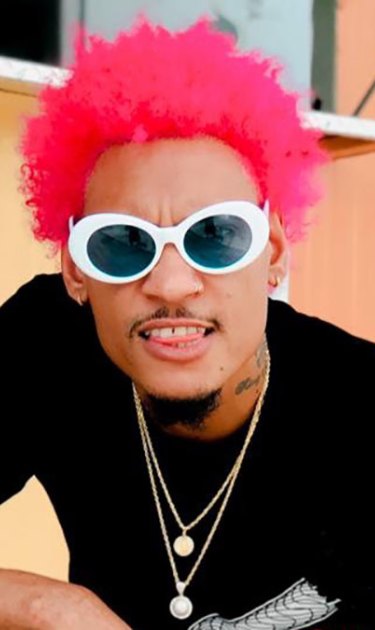Kiko El Crazy Is Ready to Make Dominican Dembow a Global Movement“Vaina, ya no es vaina, es Pampara,” Jose Alberto Rojas Peralta says.
Known artistically as Kiko El Crazy, he proclaimed himself as the megaphone for the Dominican street codes: pampara (a replacement for the word vaina) is one of the many phrases he’s made famous. Following the success of “Trucho,” an underground dembow track alongside Rochy RD, a style change and a co-sign by El Alfa, he’s become the dembow phenomenon of the moment.
For inspiring artists, his story serves as motivation and hope, as he was once ready to give up music due to his inability to connect with the Dominican audience after over a decade in the industry. His rapid rise is a reality he is still adjusting to. His days consist of performing shows, tackling interviews and remaining relevant. “I get anxious,” he admits to Remezcla. “I can’t even sleep thinking about what I’m going to do tomorrow. It’s been a drastic change from one day to another.”
Social media played a significant role in his three-month growth. His scandalous personality, signature two-step dance and beef with artists within the genre created buzz — making him an Instagram favorite and attracting thousands of followers to his page. Recently signing a distribution deal with Rimas Music, he’s looking forward to the months ahead. ”There are many projects to come. It’s a magnitude never before seen in the Dominican Republic with dembow, and Rimas is going to do something with me that hasn’t been done in the music of the Dominican Republic.” He’s still stirred over his proudest moment yet, his surprise performance during Amenazzy’s set for the closing of Verano Presidente at the Olympic stadium Felix Sanchez. “That night changed my life, and it’s all thanks to Tito Flow, Amenazzy’s manager,” he says.

His artistic journey began with a trip to the studio alongside his friend and now-deceased rapper Monkey Black. As he sat in a DIY studio, he watched as a song came to life. “I saw him rap over a beat and I loved it. It frustrated me… I witnessed how he recorded the voices, and I thought to myself, “so this is music” he shares. This experience was a defining moment for him.
The 29-year-old credits his time as a member of Lapiz Conciente’s rap squad El Army, as the years he learned to organize himself as an artist. He became known for his romantic dancehall and R&B-influenced melodies — a trademark he carried on years after his exit from the group in 2014. “I made more romantic music, with profound lyrics. The music didn’t connect though. When I decided to make dembow it started to work,” he says.
He admits that like many other artists, there was a time he wanted nothing to do with the genre. “I liked it but didn’t respect it,” he says, adding that “I didn’t see it as a genre in which you can excel because it was a style that was too underground.” His point of view at the time was that dembow needed to evolve lyrically and melodically. His opinion has changed since: “With time and thanks to the work of El Alfa and other artists from [The Dominican Republic] the genre has evolved tremendously.”
Ironically, his intro to the urbano-sphere, pre-El Army era, was a 2007 dembow entitled “Cuanto Camu,” an unofficial remix to Jowell & Randy’s “Pasto Pelu.” As for his comments on making “good music” before his crossover, he’s aware that both sub-genres are good music.
While he considers his time in El Army as one of the most beautiful experiences, he does admit he assumed a persona that wasn’t fully him. Replacing his dreadlocks for a bright pink fro and his romantic lyrics for street phrases, he reintroduced himself to the scene while successfully pivoting to dembow. Kiko’s unique choice of clothing, motivated by Tito Flow, which normally involves peculiar accessories, bright shorts, and printed socks, has propelled him as a style icon.
Despite the suspicions surrounding the authenticity of his “new” persona, Kiko is firm in that he was never truly himself in the past.In an interview on Alofoke, he referenced a J Balvin and Bad bunny interview saying “They spoke about coming out of the closet, and what they meant when they say come out — something that happens on a daily is that there are people that are a certain way but because they’re afraid of what others will say they cave in.” Today, Kiko el Crazy is unapologetic about who he is. “Today’s reality is dembow,” he says. The Los Mina native has all sectors of the country turnt to his features on Crazy Designs “Dejen Su Lokera” and El Elfa’s ‘Mueve La Cadera.” He recently dropped a new single, “Bajale”with Omy de Oro.
As dembow becomes more global, he hopes that the sound becomes normalized in different spaces. “I hope that American artists hop on dembow, that dembow becomes normal. And it’s something I believe is already happening with El Alfa and Lil Pump.”




